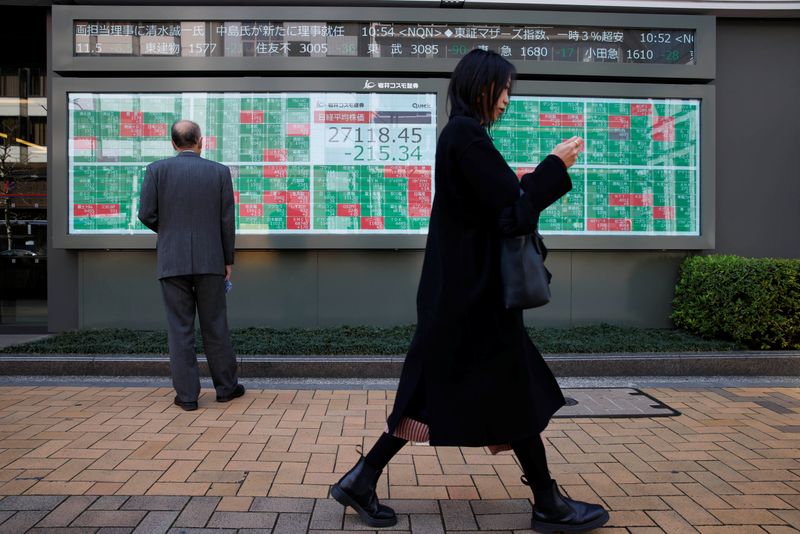By Rae Wee
SINGAPORE (Reuters) -Asian stocks fell broadly on Thursday, while longer-dated U.S. bond yields rose alongside the dollar as investors assessed the monetary policy and inflation outlook in the world’s largest economy.
Bitcoin steadied above $90,000 after having surpassed that level in the previous session, turbocharged by Donald Trump’s return to the White House and the view that his administration will be a boon for cryptocurrencies.
The world’s largest cryptocurrency last traded 1.6% higher at $90,067, having already soared more than 30% on a two-week rolling basis.
In the broader market, traders responded to a U.S. inflation print that was in line with expectations by ramping up bets on a Federal Reserve rate cut next month, though the monetary policy outlook for 2025 and beyond was clouded by Trump’s return to office.
Trump’s plan for lower taxes and higher tariffs are expected to stoke inflation and reduce the Fed’s scope to ease interest rates, buoying the dollar.
Edison Research also projected on Wednesday that the Republican Party will control both houses of Congress when the President-elect takes office in January, which would enable Trump to pursue his agenda largely unhindered.
Uncertainty over potentially larger U.S. deficits and stickier inflation was reflected in longer-dated U.S. bond yields, which pushed higher in Asia trade on Thursday. [US/]
The benchmark 10-year Treasury yield peaked at 4.483%, according to LSEG data, its highest since July 1.
The 30-year yield hovered near a five-month peak and last stood at 4.6505%.
“Speculation about what Trump might do on the domestic policy and trade front are unlikely to be featured in the Fed’s December projections. This will change as the first policies are being rolled out,” said Boris Kovacevic, global macro strategist at Convera.
“The actual effect of tariff increases and tax cuts will mostly be felt after 2025 as both the implementation and transmission to the real economy take time. This will give the Fed some time to change its reaction function accordingly.”
On the shorter end of the curve, the two-year yield, which typically reflects near-term rate expectations, similarly ticked up 3 basis points (bps) to 4.3153%.
Markets are now pricing in an 83% chance of a 25 bps rate cut from the Fed next month, up from about 59% a day ago, according to the CME FedWatch tool.
However, expectations of Fed cuts next year have been pared back following Trump’s election victory last week.
The dollar, meanwhile rode, longer-dated Treasury yields higher on Thursday, ignoring the rising bets of a Fed cut in December which would typically be negative for the currency.
The greenback pushed the euro to a one-year low of $1.0534 and broke above the 156 yen level in the Asian session.
The dollar index peaked at a one-year high of 106.77.
The Australian dollar fell 0.33% to $0.6464, further pressured by a downside surprise on domestic employment.
CHINA ANGST
Shares in Europe looked set for a steady open, contrasting with declines in Asia.
EUROSTOXX 50 futures ticked up 0.04%, while FTSE futures added 0.02%.
Nasdaq futures meanwhile fell 0.18%. S&P 500 futures eased 0.1%.
MSCI’s broadest index of Asia-Pacific shares outside Japan last traded 0.63% lower, paring slight gains from earlier in the session.
That came on the back of a fall in Chinese stocks as they struggled to make headway. The mainland CSI300 blue-chip index fell 0.92%, while the Shanghai Composite Index lost 0.96%.
Hong Kong’s Hang Seng Index slid 1.5%.
Investors were left unimpressed by Beijing’s latest support measures to shore up China’s ailing economy, after the finance ministry unveiled tax incentives on home and land transactions on Wednesday.
China’s property market is grappling with a prolonged downturn since 2021 and remains a major drag on the world’s second-largest economy.
“If you’re considering buying a house or in the market for one, it helps, certainly. But it’s not going to change the situation itself,” said Alvin Tan, head of Asia FX strategy at RBC Capital Markets.
“It’s not going to galvanise a lot of people to start (buying) homes. The inventory overhang is still there.”
In line with the declines across Asia, Japan’s Nikkei erased early gains to last trade 0.11% lower.
Elsewhere, oil prices fell on worries of higher output amid sluggish global demand. Brent crude futures eased 0.62% to $71.83 a barrel, while U.S. West Texas Intermediate crude (WTI) futures shed 0.7% to $67.95. [O/R]
Spot gold fell 0.53% to $2,560.15 an ounce. [GOL/]

